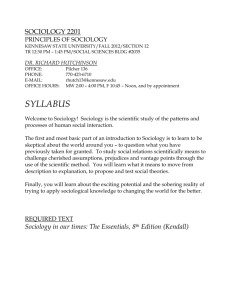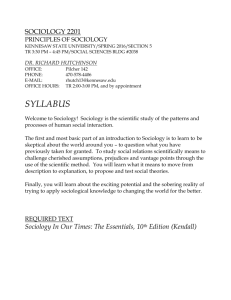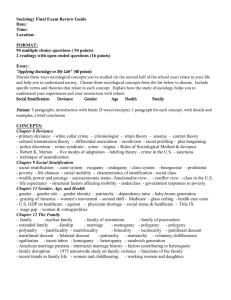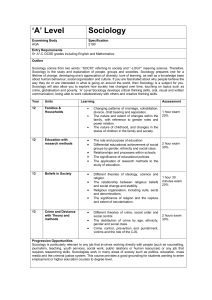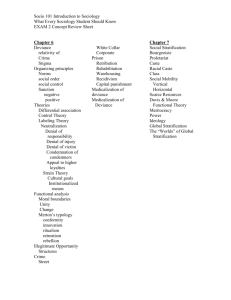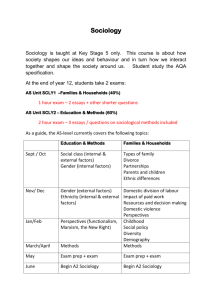SOCIOLOGY 201 - Kennesaw State University
advertisement
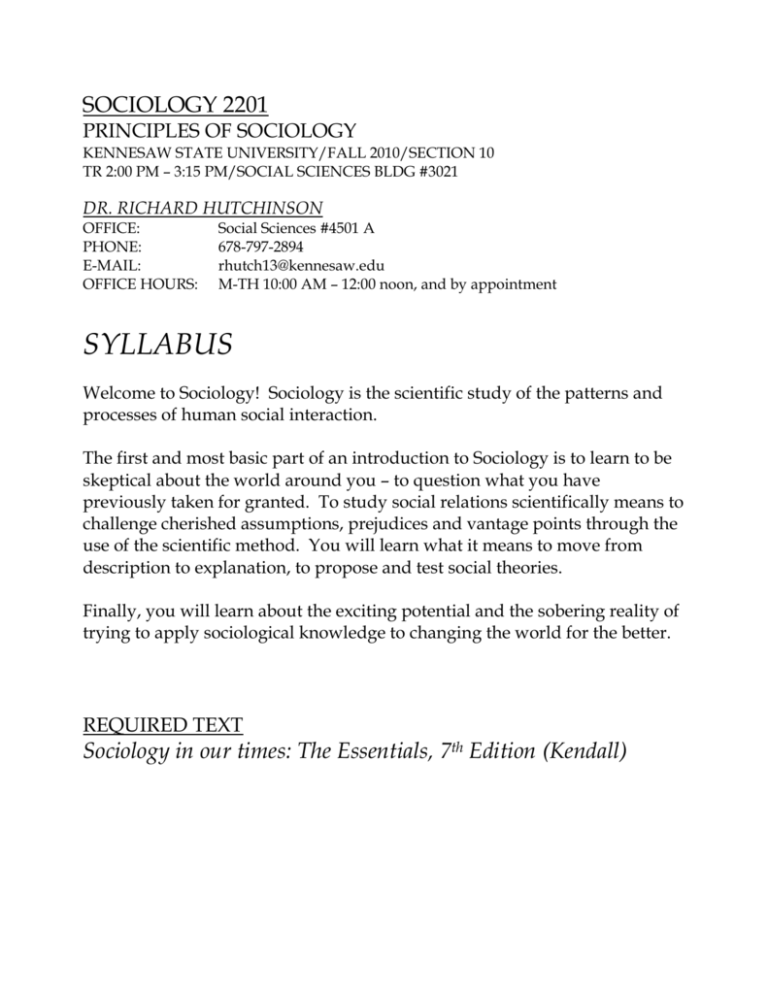
SOCIOLOGY 2201 PRINCIPLES OF SOCIOLOGY KENNESAW STATE UNIVERSITY/FALL 2010/SECTION 10 TR 2:00 PM – 3:15 PM/SOCIAL SCIENCES BLDG #3021 DR. RICHARD HUTCHINSON OFFICE: PHONE: E-MAIL: OFFICE HOURS: Social Sciences #4501 A 678-797-2894 rhutch13@kennesaw.edu M-TH 10:00 AM – 12:00 noon, and by appointment SYLLABUS Welcome to Sociology! Sociology is the scientific study of the patterns and processes of human social interaction. The first and most basic part of an introduction to Sociology is to learn to be skeptical about the world around you – to question what you have previously taken for granted. To study social relations scientifically means to challenge cherished assumptions, prejudices and vantage points through the use of the scientific method. You will learn what it means to move from description to explanation, to propose and test social theories. Finally, you will learn about the exciting potential and the sobering reality of trying to apply sociological knowledge to changing the world for the better. REQUIRED TEXT Sociology in our times: The Essentials, 7th Edition (Kendall) SCHEDULE TUESDAY THURSDAY WEEK 1 8/17 What is Sociology? (Chapter 1) 8/19 The Scientific Method: Facts & Theories (Chapter 1) WEEK 2 8/24 Durkheim’s Study of Suicide: Part 1 (Chapter 1) 8/26 Durkheim’s Study of Suicide: Part 2 (Chapter 1) WEEK 3 8/31 Facts & Theories Revisited (Ch. 1) 9/2 Research Methods: Surveys (Chapter 1) WEEK 4 9/7 Research Methods (Chapter 1): Experiments & Field Research 9/9 Sociological Theory (Chapter 1) WEEK 5 9/14 Socialization (Chapter 3) 9/16 Culture (Chapter 2) WEEK 6 9/21 Groups & Organizations (Chapters 4 & 5) 9/23 EXAM ONE WEEK 7 9/28 Demography (Chapter 15) 9/30 The Demographic Transition (Chapter 15) WEEK 8 10/5 Population & Environment (Chapter 15) 10/7 The Environment: Energy & Climate Change (Chapter 15) WEEK 9 10/12 Gender & the Family (Chapters 10 & 11) 10/14 Defining and Measuring Crime (Chapter 6) WEEK 10 10/19 Explaining Crime, Part 1 (Ch. 6) 10/21 Explaining Crime, Part 2 (Chapter 6) WEEK 11 10/26 Crime Policy (Chapter 6) 10/28 EXAM TWO 2 WEEK 12 11/2 Social Stratification (Chapter 7) 11/4 The Origin of Stratification (lecture only) WEEK 13 11/9 Stratification in America Today (Chapter 7) 11/11 Islam and Politics (lecture only) Global Stratification (Chapter 8) WEEK 14 11/16 Race and Ethnicity (Chapter 9) 11/18 Ethnic Conflict (Chapter 9) WEEK 15 11/23 EXAM THREE 11/25 FALL BREAK – NO CLASS WEEK 16 11/30 ONLINE LECTURE & QUIZ Politics and the State (Chapter 13) 12/2 ONLINE LECTURE & QUIZ Religion, Part 1 (Chapter 12) ONLINE LECTURE & QUIZ Religion, Part 2 (Chapter 12) EVALUATION Your grade will be based on: 1) Three multiple-choice exams, to be administered in class, consisting of 50 2-point questions. Each exam will be worth 100 points, for a total of 300 points. Exam 3, the final exam, will not be cumulative, but will cover the third unit, the last three weeks of the course. These exams will be graded on a standard point system: 90+ = A, 80+ = B, 70+ = C, 60+ = D, and 59 and below = F. 2) Fifteen online quizzes, each worth 10 points, for a total of 150 points. The quizzes will be available on Georgia View/Vista from Friday through the following Tuesday. Since you will have 5 days to take each quiz, there will be no make-ups allowed. It will be your responsibility to check Vista and take the quizzes in the scheduled time period. CLASS TOTAL: 450 points 3 POLICIES 1) ATTENDANCE This is a lecture class. Reading the required textbook is important, but it is no substitute for attending and taking good lecture notes -- I do not lecture straight out of the book. If you ever have to miss class, make sure to get the notes for the lecture you missed from a fellow student. If you have a university-sanctioned reason to miss an exam, such as an athletic event, you must notify me in advance in order to make-up the exam, preferably prior to the regularly scheduled time. If you are sick, you must let me know the day of the exam in order to qualify for making up the exam. 2) CHEATING It is your responsibility to maintain academic integrity. Do not cheat or plagiarize, and do not aid and abet others in cheating or plagiarizing. My policy for a first offense is that if you are caught cheating or helping a fellow student cheat your grade for that assignment will be a ZERO. Any subsequent infractions will result in your expulsion from the course with an F, and a referral to the University Administration for further sanctions. 3) ACCOMMODATIONS Any student requiring accommodations or services due to a disability must contact the disabled Student Support Services office in the Student Development Center (Student Center #267 – 770-423-6443), which is located in the Carmichael Student Center addition. I will work with dSSS to make a reasonable accommodation for testing once verification has been provided to me by the office. 4
